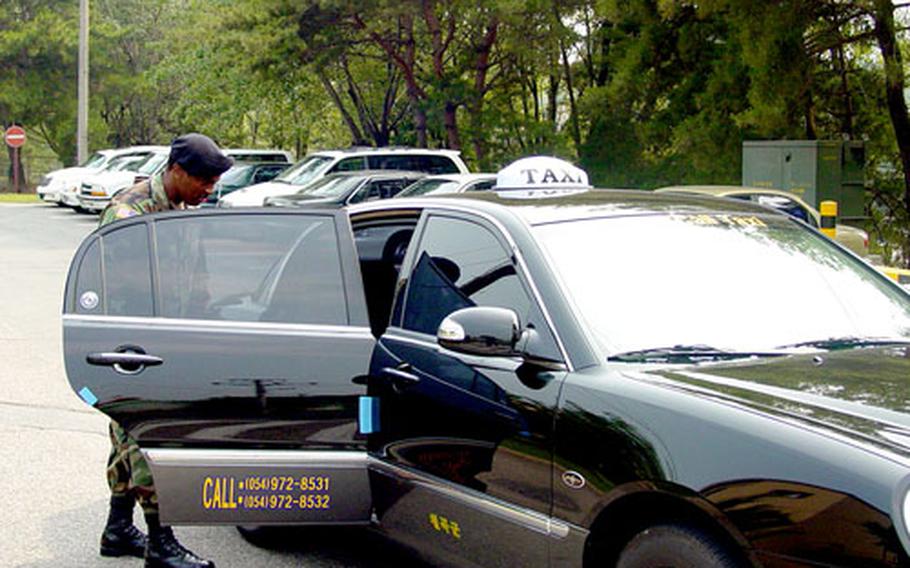
Army Sgt. 1st Class Terry Newby looks inside a taxi on Monday that is part of a new service at Camp Carroll in Waegwan, South Korea. Newby is Camp Carroll’s installation noncommissioned officer-in-charge. (Pak Chong-ku / U.S. Army)
The next time troops at Camp Carroll in South Korea need a taxi, they won’t have to try to get one by calling a driver’s cellular phone and hoping he’s not too busy to pick them up.
Instead, soldiers at the big logistics depot in Waegwan now can turn to a taxi service formed exclusively to serve Camp Carroll.
The service began earlier this month under a June 7 written agreement between the Army’s Area IV Support Activity and the governor of Chilgok County, of which Waegwan is a part.
Problems with a previous taxi service arrangement at Camp Carroll led Army officials there to seek an improved system, officials said Monday.
“The problem was, we had the individual contract with the owners of taxi — individual drivers — but we find out there are a lot of … problems in controlling or managing of the individual drivers,” said Pak Chong-ku, Camp Carroll’s community relations officer.
Under the old plan, Pak said, soldiers would call the taxi drivers directly.
Sometimes, Pak said, the drivers would disregard the calls.
Also, allegations were made that drivers overcharged soldiers, Pak said.
“You had to call an individual taxi,” said Camp Carroll installation manager Wilfred Plumley.
“He could be off, he could be sick, he could be in Taegu, he could be anywhere, and there was no standardization of what they did.”
Taegu, South Korea’s third-largest city, is about a half-hour south of Waegwan.
But with encouragement from Chilgok County governor Bae Sang-do, a group of drivers formed the Camp Carroll Call-Taxi Association, said Pak.
It consists of five drivers, each with a cab, and an English-speaking dispatcher to answer the phone, officials said.
Soldiers wanting a cab, Pak said, can call seven days a week to the service’s local Waegwan commercial numbers: 972-8531 or 972-8532.
Officials also have set aside parking spaces for taxis, two each at the post exchange and commissary.
Fares are based on two rate schedules: 4 a.m. to midnight rates are 1,500 Korean won, (about $1.50) plus 100 won for every 177 meters (about 194 yards) driven and for every 40 seconds when not in motion.
The rate from midnight to 4 a.m. is 1,800 won, (about $1.80) plus 100 won for every 177 meters driven or for every 40 seconds when not in motion.
Calling a taxi from inside Camp Carroll carries no pick-up fee but calling one from off-post costs 1,000 won extra (about $1.00).
The new service is especially helpful at a post such as Camp Carroll, Plumley said, in part because of recent rules that forbid noncommissioned officers in pay grades E-5 and E-6 from driving private cars.
“So all those guys who had vehicles before, don’t anymore,” said Plumley.
“Also, Camp Carroll is a very spread-out installation. Especially if you’re going from the commissary and you live up on what we call BEQ Hill, that’s a good walk. … We have a post shuttle bus … but it may not be running at the exact time you need it.”